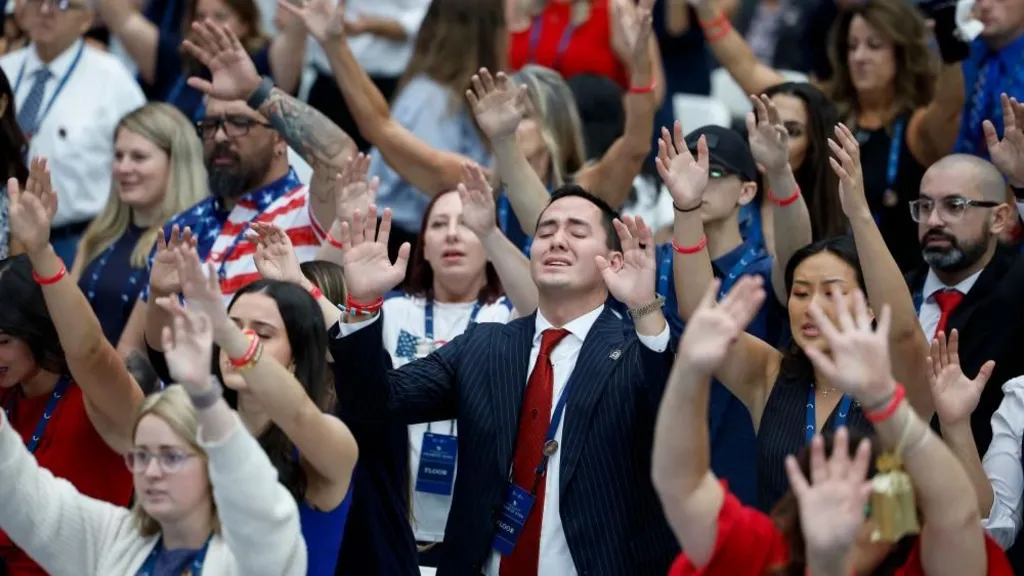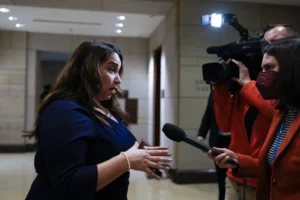A Tragedy at Utah Valley University
On September 10, 2025, during the kickoff of his “American Comeback Tour,” Charlie Kirk, founder of Turning Point USA, was fatally shot while speaking at Utah Valley University in Orem, Utah. The event was one of many campus debates he led, and turned deadly when a single rifle shot reportedly fired from a rooftop struck him in the neck.
Authorities arrested 22-year-old Tyler Robinson in connection with the murder. He has since been charged with aggravated murder and related offenses.
The loss reverberated widely. Charlie Kirk was known for mobilizing young conservatives, often directly influencing political discourse and voter turnout. His death exposed both the personal vulnerabilities of public activism and the broader stakes in America’s polarized political environment.

Erika Kirk’s Response: Forgiveness, Faith, and Leadership
Erika Frantzve Kirk, 36, married Charlie Kirk in 2021; they have two children. Sources report she had long been involved in Turning Point USA, speaking at events, and helping with organization, even when not in the limelight.
In the hospital, after Charlie’s death, Erika insisted on seeing his body despite warnings from hospital staff. She described the moment: his eyes were semi-open; she saw a faint smile, which she interpreted as a sign that her husband did not suffer long.
At the public memorial service (September 21, 2025), Erika delivered a speech marked by sorrow but also by strength. She forgave the man accused of her husband’s killing, saying: “I forgive him because it was what Christ did, and it is what Charlie would do.” She proclaimed her commitment to carry on Charlie’s mission.
In her first major post-assassination move, Turning Point USA’s board unanimously appointed her as CEO and Chair, entrusting her to lead the organization forward.
A Memorial Charged with Political Meaning
Thousands gathered at Glendale’s State Farm Stadium, packed with supporters, conservative leaders, and media. Speakers included former President Donald Trump, Vice President J.D. Vance, and other high-profile Republican figures. They paid tribute to Kirk’s activism, often framing his life and death in terms of sacrifice, patriotism, and martyrdom.
Donald Trump’s speech diverged in tone from Erika’s. While she emphasized forgiveness, faith, and Christian values, Trump expressed anger, framing the killing as part of a broader political war. He called Charlie Kirk a hero and spoke about opposing the “radical left,” criticizing political enemies, and positioning Kirk’s death as an attack on all of conservatism.
Erika, by contrast, explicitly said she did not want the burden of deciding on the death penalty for the accused. She left that to the government, underlining her desire not to have the killer’s blood on her own hands.
Continuing the Mission: Turning Point USA Under Erika
With her appointment as CEO and Chair, Erika Kirk steps into a tumultuous role. Turning Point USA, founded by Charlie in 2012, grew large through hundreds of high school and college chapters and was especially influential in mobilizing youth for conservative causes.
Erika has pledged to continue not only her husband’s mission but also his scheduled work: the college tour, public speeches, and activism aimed at shaping student attitudes toward politics, religion, and America’s global role. She has spoken about growth, ensuring Turning Point USA becomes “stronger, bolder, louder, greater than ever.”
Many are watching to see how she navigates between the strong evangelical faith that underpins Turning Point, the demands of political engagement (and sometimes combative rhetoric), and the responsibility of leadership in a movement facing intense scrutiny.
The Stakes: Politics, Speech, Violence
Charlie Kirk’s assassination comes amid growing concern over political violence in the United States. Public discourse has become sharper, more polarized; threats to speakers, protests, and violent incidents have increased. Many see the killing as symptomatic of deeper societal fractures.
Erika’s choice to forgive the alleged shooter, to draw on Christian doctrine, and to stay publicly committed to her husband’s vision may resonate deeply with conservative faith-based constituencies—but also prompt debate around justice, the death penalty, and how public figures respond under pressure.
The juxtaposition of Erika’s forgiveness with President Trump’s anger shows tensions even within aligned political spaces: how to handle loss, how to treat political opponents, how to balance mercy and justice. It raises questions about leadership style, the moral messaging of politics, and how movements endure after charismatic founders are gone.
Looking Ahead: What Might Change, What Likely Doesn’t
Erika’s new role means Turning Point USA will likely continue on its established path, but with subtle shifts in tone. Her faith-driven message may amplify Christian themes in the organization’s activities and may moderate some personal aggressive rhetoric in favor of grace, at least publicly. Internally, expectations are high: can she maintain momentum? Can she safeguard the movement’s infrastructure (chapters, funding, visibility) without Charlie’s personal presence?
Politically, this event has given conservatives a rallying point. Analysts say there’s momentum around preserving Charlie’s legacy—and possibly using it to mobilize young voters ahead of midterm elections. But there are also risks: missteps in rhetoric, or perceived hypocrisy, could weaken trust. Similarly, any legal outcomes (trial of Tyler Robinson, decisions on punishment) will be under intense public scrutiny. Reuters
In the broader national conversation, the case underscores the urgent debates over political violence, the sanctity of free speech, and how polarized societies process grief and heroism. Erika’s message of forgiveness could provide a counternarrative, but it will compete in a public sphere often dominated by anger and retribution. CBS News
Conclusion: Legacy, Forgiveness, Future
Erika Kirk’s journey from widow to leader in a movement built on youth, faith, and patriotism underscores both tragedy and opportunity. Her forgiveness of her husband’s accused killer—and refusal to seek personal vengeance—transforms personal grief into moral leadership. Taking up the mantle at Turning Point USA, she now faces the largest question: can she preserve the foundation her husband built, while steering it toward wider impact and more compassionate discourse? Her leadership will be intensely watched—for how she balances faith and politics, unity and conflict, and how she helps shape not just an organization but a movement’s future path.
For those tracking this moment, it is clear: this is not merely an obituary for Charlie Kirk. It is the opening chapter of a new era, with Erika Kirk writing its first lines.
Subscribe to trusted news sites like USnewsSphere.com for continuous updates.





